Technical Report 2008-01-21
Content shown in the technical articles are the sole opinion and views of the authors or companies, which are not necessarily congruent to opinion and views of the editors.
|
Food-grade bottle-to-bottle recycling process successfully undergoing tests in practical operation Krones is closing the PET circuitDr. Thomas Friedlaender, KRONES AG
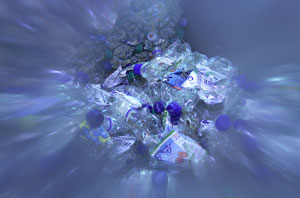
Around 15 per cent of all PET containers are already being recycled in Europe, and the proportion is rising. PET has already become widely accepted in many areas of the beverage industry as the most future-compatible packaging material around, a trend accelerated still further by the eco-compatible option of bottle-to-bottle recycling. Current market data give the proportion of PET containers being recycled into new bottles in Europe as 15 per cent - and the figure is steadily rising. Affordable production of PET beverage containers from PET recyclate means saving on costs for raw materials and reducing the amount of refuse dumped on landfills, while simultaneously making a contribution towards covering the ongoing demand for PET bottles. This is why Krones is now offering complete PET recycling lines developed in-house. The idea behind this bottle-to-bottle recycling process is to make used PET bottles available again for their original purpose. This requires certified recyclates, approved for coming into direct contact with foodstuffs and beverages. 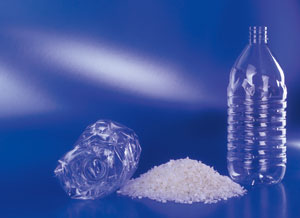
In comparison to pellets, flakes lead to particularly affordable operating costs, thanks to the short processing times and the low energy consumption levels involved. Responsibility for resource-economical technologies As one of the leading producers of technologies and engineering for the beverage industry, Krones readily accepts its responsibility for offering resource-economical technologies of this nature, and for providing users with an option for utilising eco-compatible, commercially viable solutions for up-to-the-future packaging. After Krones had successfully gathered some initial experience with PET recycling plants both in Switzerland and in Germany, it was the company's declared goal to develop its own compact-size bottle-to-bottle recycling system for bottlers and converters alike. Successful cooperation between the Krones Research and Development Department and colleges and universities, backed up by comprehensive in-house expertise, has smoothed the path towards reaching this milestone in Krones' product portfolio. It was the input from the Plastics, Cleaning and Inspection Technology Divisions, in particular, that was crucial in bringing this development project to fruition. The vast majority of the process-determinant components and devices are manufactured in-house. 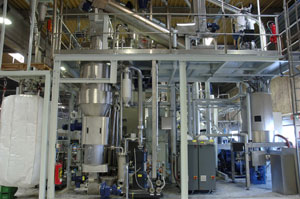
Migrated constituents are removed in the "Supercleaning" B2B module. Low operating costs, thanks to flakes
The compact-size system is modular in construction and has been dimensioned for outputs of 500 kg/h or 1,000 kg/h, with the entire process subdivided into a washing module and a B2B (bottle-to-bottle) module. These two can be offered together, or each of them separately. The washing module as a stand-alone system is also available for an output of 2,500 kg/h. In contrast to recycling processes involving plastic pellets, Krones has opted for flakes, which due to their short processing times and the low energy consumption involved make for particularly affordable operating costs. The process now developed comprises the following steps: material preparation, soaking/washing/rinsing, separation into PET and polyolefines (PO), a downstream mechanical/thermal drying function, plus thick-thin separation, and finally the removal of migrated constituents in the "supercleaning" section. Krones' inspection technology enables the entire process to be monitored inline. 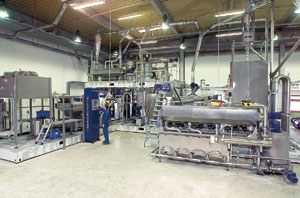
The degree of cleanliness reached in the washing module is crucial in achieving the high level of quality targeted for the recyclate. Crucial to quality: the washing process
The degree of cleanliness reached in the washing module is crucial in achieving the high level of quality targeted for the recyclate. This makes washing the quality-determinant section of the recycling process, because it will in most cases not be possible to compensate for anything omitted here in the downstream B2B process. The washing function is composed of three steps: soaking, detaching any outer soiling from the flakes by mechanical means, chemicals, temperature and time, plus rinsing to remove contaminants from the washed PET material. In the pre-cleaning module, the flakes undergo uniform, gentle pre-soaking, after which they are passed to the main cleaning zone. Main cleaning is accomplished by causing the flakes to rub against each other and by soaking them in hot water with a caustic content. To remove any residues of caustic soda solution, active ingredients and glues from the washed flakes, they are rinsed with hot water. The water fed into the process is recirculated, which makes for highly efficient water utilisation. It is very important to remove soiling and glues from the washing liquids throughout the entire washing process. For this purpose, Krones has successfully integrated some of its tried-and-tested filtration technology from the field of returnable-bottle cleaning into the recycling system's washing processes. The degree of the flakes' cleanliness is crucially determined by optimum interaction between the parameters of temperature, chemicals, mechanical means and time. The fact that Krones can draw on more than 50 years of experience in the field of bottle cleaning was vital for implementing a washing technology of such exceptional quality. 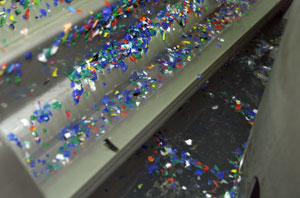
The lighter particles from the closure fraction float on the surface of the water, and are continuously removed from there. Removing migrated constituents by means of supercleaning The two major factors influencing the superclean process are temperature and dwell time. High temperatures, in particular, will accelerate the reaction behaviour of PET, though this means that unwanted decomposition and oxidation reactions will take place faster, too. The Krones process operates at comparatively low temperatures, without needing to melt the material. This, together with the low process temperatures employed, results in significant savings of energy costs while simultaneously ensuring a high degree of operational dependability. In this process, there are no material losses due to deliberate chemical conversion of the PET material. The thermal process removes any migrated constituents from the washed flakes, thus rendering them suitable for use as packaging for foodstuffs and beverages. In certain limits, the IV value can be changed so as to meet the requirements posed by the subsequent application. The Krones B2B module - as a separate unit - was subjected to what was called the challenge test under "worst case" conditions, i.e. without the upstream washing process and without the thick-thin separation step. This test was conducted and verified with the involvement of both the Fraunhofer Institute for Process Engineering and Packaging, and the American Food and Drug Administration (FDA). The recyclate produced in the Krones process is suitable for re-use in direct contact with foodstuffs and beverages, and complies both with the regulations laid down by the FDA and the guidelines issued by the German Federal Institute for Risk Assessment (BfR) for the use of the material in packaging for food and beverages. 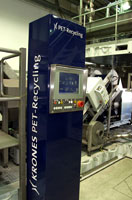
Simple line control at the operator column. Inline monitoring with inspection technology
Krones is in parallel developing a path-breaking concept for monitoring the quality of the flakes. The aim is to have the entire recyclate checked for product residues and contaminants by means of a sensor. In this step, all of the material produced will then be subjected to an inspection routine at the end of the B2B module, for example. In other processes, by contrast, only random sampling is customary. The method developed by Krones firstly assures impeccable food-grade quality, and secondly, full-coverage tracking of how the material was produced. 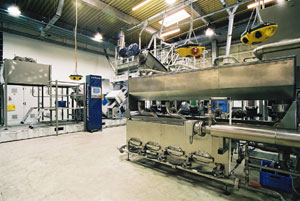
The compact-size line concept has been conceived for outputs of 500 kg/h or 1,000 kg/h. Results obtained in practical operation are living up to expectations
In the run-up to a project planned by one of our customers, the requisite tests were conducted with maximised resemblance to actual operating conditions. Material from the user was washed in Krones' in-house recycling line, and any migrated constituents adhering to it were removed. After that, the flakes were checked by the Fraunhofer Institute and declared to be food-grade quality. The material examined in the headspace gas chromatograph essentially showed only PET-typical substances, of the kind also found in new PET merchandise./p> Preforms were produced from the recyclate at a ratio of 50/50 and 40/60 (recycled/new PET). These were then used in one of the customer's lines to blow-mould bottles, which were subsequently filled. Analyses performed in the run-up phase to this customer trial have been confirmed on this line. The bottles produced from these preforms have exceeded expectations, not least in terms of their visual characteristics. Single-sourcing capability
Krones meanwhile possesses its own technology for bottle-to-bottle recycling, and has set up a separate engineering department tasked with supporting users by providing the requisite expertise in terms of equipment, control, planning and erection of this up-to-the-future technology. The firm's own recycling pilot plant enables it to conduct client-specific tests in the preliminary phase of line design. As with Krones' filling technology, here, too, maximised quality is achieved for low operating costs, thanks to the single-sourcing principle. KRONES AG Böhmerwaldstraße 5 Phone: +49 (0) 9401 70–0 Internet: www.krones.de |
 back to the list back to the list |  back to top back to top |



